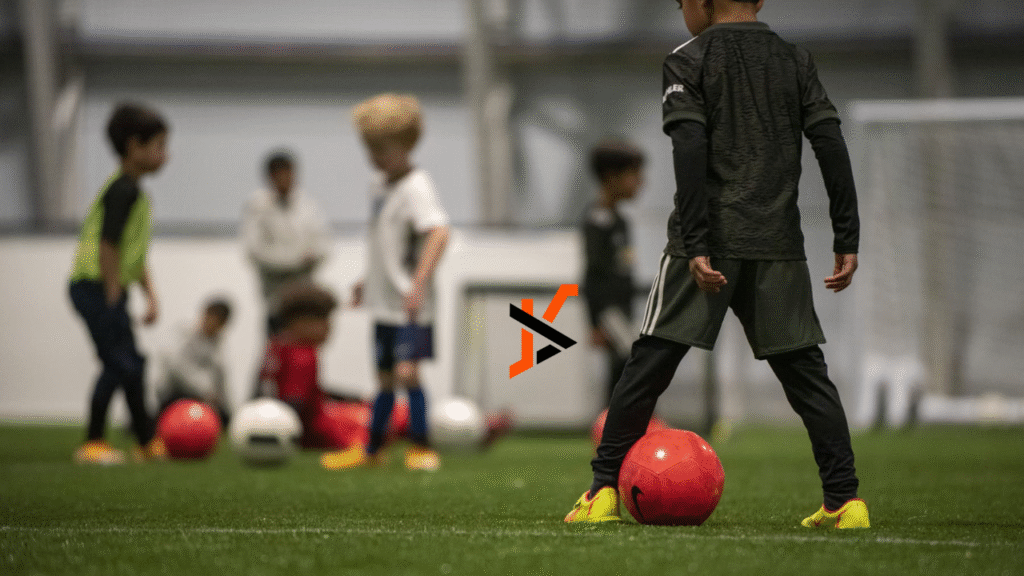1. Introduction
Sports play a significant role in shaping children’s physical, emotional, and social development. Through consistent engagement in football, youngsters naturally enhance fitness, coordination, and spatial awareness. Moreover, these activities offer vital lessons in teamwork, perseverance, and self-belief. “We Make Footballers” channels this potential into a structured program designed to empower every participant. With a clear mission to cultivate confident, resilient, and socially adept children, it leverages the appeal of football to nurture their whole-person growth.
2. Beyond the Game: Life Skills Through Football
Structured coaching at “We Make Footballers” is more than drills and passes—it’s a vehicle for essential life lessons. Training routines emphasize discipline and mental stamina, requiring commitment, punctuality, and effort. Coaches intentionally pose challenges that teach children to stay focused under pressure and bounce back from mistakes.
- Discipline: Regular sessions reinforce the importance of showing up prepared and ready to learn.
- Focus: Players practice decision-making rapides in dynamic play, enhancing concentration skills.
- Resilience: Overcoming missed goals and losses teaches adaptability and mental strength.
Parents often share stories of transformations: a once-insecure child emerging as a confident team captain or a shy defender taking initiative in matches. Leadership blossoms naturally when children feel supported and trusted, and coaches at “We Make Footballers” fuel that growth.
3. The Role of Coaches as Mentors
Coaches at “We Make Footballers” serve as far more than technical instructors. They are mentors who guide behavior, reinforce values, and model respect. By cultivating professionalism and empathy, they instill a growth mindset that transcends sport.
Open communication between coaches and parents ensures a child’s development is well-rounded. Coaches share insights on progress, character development, and areas for growth. Parents, in turn, support positive habits at home—reinforcing punctuality, healthy meals, and fair play. This collaborative dynamic fosters consistent messaging and nurtures the child’s personal development.
4. Creating a Safe and Supportive Environment
Feelings of belonging and safety are central to every session. “We Make Footballers” prioritizes emotional well‑being by fostering respect and camaraderie. Coaches manage interactions thoughtfully, mitigate aggression, and intervene if any child feels excluded.
Inclusivity remains a cornerstone: sessions welcome children of diverse backgrounds and skill levels, celebrating individual and collective achievements. Bonds formed through shared drills and team play cultivate empathy, communication, and conflict-resolution skills. Children discover that success is rooted not only in points, but also in shared effort and mutual support.
5. Stories of Transformation
Testimonial 1 – Aria, Age 8: Initially timid and anxious in group settings, Aria gradually asserted herself during warm-up drills and small-sided games. By season’s end, she volunteered to lead her teammates at halftime, demonstrating both confidence and effective communication.
Testimonial 2 – Mateo, Age 11: Struggling with authority, Mateo reacted poorly to corrections until coaches applied a patient, strength-based approach focusing on his creative flair. Over several weeks, his attitude shifted—he began conversing thoughtfully with teammates and embraced responsibilities like organizing drills.
Testimonial 3 – Sofia, Age 10: After moving to a new city, Sofia found it difficult to make friends. Joining the program introduced her to peers with shared interests. Through practice and encouragement, she became a consistent participant, forming friendships on and off the pitch.
These stories illustrate how football becomes a conduit for overcoming anxieties, embracing leadership, and fostering enduring peer relationships.
6. The “We Make Footballers” Philosophy
At the heart of the program lies a simple yet profound philosophy: balance purposeful structure with engaging fun. Each session is carefully designed to blend skill development with enjoyable, age-appropriate games.
Coach training emphasizes adaptability—recognizing that each child thrives under different learning styles. Some respond to visual cues, others to hands-on demonstrations or peer encouragement. By tailoring coaching to fit each player’s personality and pace, the program ensures that children progress confidently without feeling overwhelmed.
7. Getting Involved
Joining “We Make Footballers” is a straightforward process:
- Initial Assessment: Children participate in a playful, low-pressure session that introduces basic skills and allows coaches to learn about their temperament and ability.
- Placement in Group: Based on the assessment, each child is placed in a group that aligns with their development stage.
- Regular Sessions: Weekly, 60- to 90-minute sessions offer consistent opportunities for growth—physically, mentally, and socially.
- Family Engagement: Open days and periodic parent‑coach meetings provide insights into progress and tips for reinforcement at home.
As children advance, opportunities emerge for friendly competitions, city-level leagues, or leadership roles like youth coaching assistance. This layered pathway ensures long-term engagement and offers motivated children continued challenges.
8. Conclusion
Football serves as a powerful catalyst for confidence, resilience, and life‑long skills. Through its disciplined yet nurturing environment, “We Make Footballers” supports children in becoming self-assured individuals capable of facing challenges on and off the pitch. Parents interested in seeing substantive growth in their children’s character and abilities will find that this program offers not just a sport, but a platform for transformational development.

